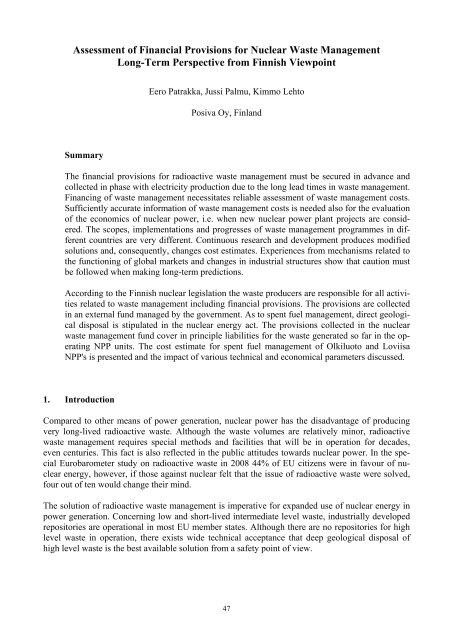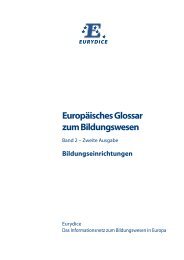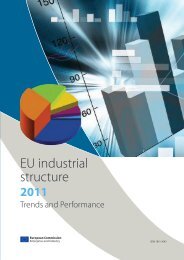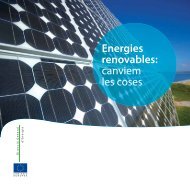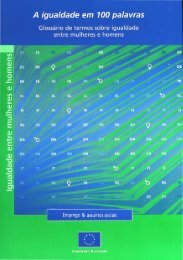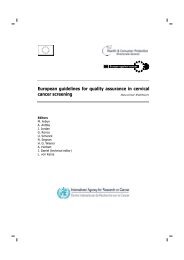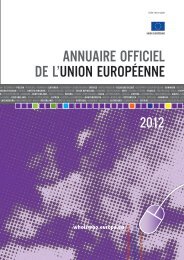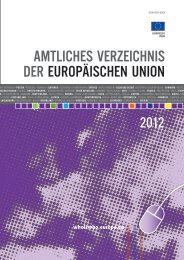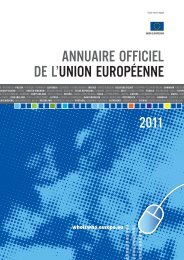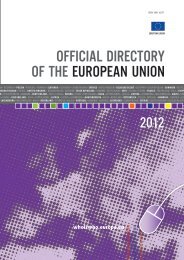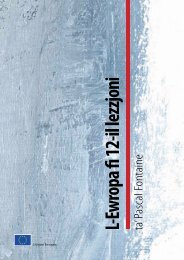- Page 2 and 3:
Interested in European research? Re
- Page 4 and 5:
LEGAL NOTICE Neither the European C
- Page 7 and 8:
TABLE OF CONTENTS FOREWORD iii CONF
- Page 9 and 10:
“Impact of advanced fuel cycle sc
- Page 11 and 12: “Sensitivity analysis techniques
- Page 13 and 14: Topic: Support actions SAPIERR-II -
- Page 15: CONFERENCE SUMMARIES
- Page 18 and 19: supported. The Commission believes
- Page 20 and 21: Ms Monika Hammarström of SKB in Sw
- Page 22 and 23: Dr Bruno of Amphos 21 urged the swi
- Page 24 and 25: measurements of actinides to determ
- Page 26 and 27: Dr Peter Blümling of Nagra in Swit
- Page 28 and 29: Future directions There seemed to b
- Page 31 and 32: 1. Introduction Keynote Address Pet
- Page 33 and 34: tive waste management, a considerab
- Page 35 and 36: the decision making process. The se
- Page 37: All initiatives leading to encourag
- Page 40 and 41: tegrating them as part of advanced
- Page 43: General introduction and objectives
- Page 47 and 48: Radioactive waste management: Where
- Page 49 and 50: The intense development in nuclear
- Page 51 and 52: Figure 3: Schematic diagram of the
- Page 53 and 54: contributed to enhance knowledge ab
- Page 55 and 56: the first time in French history, a
- Page 57 and 58: PANEL DISCUSSION Summary of the Pan
- Page 59: With the support of IAEA preliminar
- Page 64 and 65: As in all industrial activities, "P
- Page 66 and 67: The financial provisions according
- Page 68 and 69: disposal facility and decommissioni
- Page 70 and 71: The development of disposal technol
- Page 72 and 73: tions. This is a real dilemma: reli
- Page 74 and 75: the shipment. The Netherlands produ
- Page 77: SESSION III: Co-operation in geolog
- Page 80 and 81: members also from the industry, rec
- Page 82 and 83: In 2003, Posiva started the constru
- Page 85 and 86: PANEL DISCUSSION Summary of the Pan
- Page 87 and 88: John Mathieson: CATT CATT stands fo
- Page 89: SESSION IV: Communication of risk a
- Page 92 and 93: enough' and 'how safe is safe enoug
- Page 94 and 95: Communication as a scientist …
- Page 96 and 97: Geological long-term stability (pla
- Page 98 and 99: Independent evidence: natural analo
- Page 100 and 101: Requirements for trust: overview
- Page 102 and 103: Summary and conclusions � Communi
- Page 104 and 105: One important element in the commun
- Page 107 and 108: COMMUNITY RESEARCH in RADIOACTIVE W
- Page 109 and 110: ted to support for research on RWM
- Page 111 and 112: hand focuses more on the product ra
- Page 113 and 114:
ESDRED has the overall objective of
- Page 115 and 116:
most advanced partitioning processe
- Page 117 and 118:
esult of the important cross-cuttin
- Page 119 and 120:
SESSION V: Partitioning and transmu
- Page 121 and 122:
Summary An Overview of Partitioning
- Page 123 and 124:
vanced aqueous partitioning scheme
- Page 125 and 126:
A metallic alloy fuel with the comp
- Page 127 and 128:
With a salt composition correspondi
- Page 129 and 130:
Overview of Activities in Europe Ex
- Page 131 and 132:
cycling fuels do not vary significa
- Page 133 and 134:
Liquid Pb-Bi (LBE) is used as coola
- Page 135 and 136:
Figure 5: Conceptual design of EFIT
- Page 137 and 138:
eing irradiated in the HELIOS irrad
- Page 139 and 140:
In the course of the development of
- Page 141 and 142:
Impact of partitioning and transmut
- Page 143 and 144:
is generically described as Partiti
- Page 145 and 146:
(only U and Pu) and there are a sma
- Page 147 and 148:
formed where the previous study was
- Page 149 and 150:
Finally RED-IMPACT has made a large
- Page 151 and 152:
Figure 4: Spent nuclear fuel (metri
- Page 153 and 154:
7.3 Added value of P&T for a countr
- Page 155 and 156:
P&T require the development of new
- Page 157 and 158:
Impact of Advanced Fuel Cycle Scena
- Page 159 and 160:
the centre of the galleries. A bent
- Page 161 and 162:
3. Results 3.1 Impact of the therma
- Page 163 and 164:
3.3 Evaluation of the radiological
- Page 165 and 166:
and any related conclusions drawn f
- Page 167 and 168:
[9] W. von Lenza, R. Nabbi and M. R
- Page 169 and 170:
PANEL DISCUSSION Summary of the Pan
- Page 171 and 172:
Progress and Prospects: • Separat
- Page 173 and 174:
Sessions VI to VIII: Geological dis
- Page 175 and 176:
SESSION VI: Near-field processes Ch
- Page 177 and 178:
Advances in Integrating European Re
- Page 179 and 180:
Advances in research on vitrified h
- Page 181 and 182:
4.2 Advances in research related to
- Page 183 and 184:
Several experiments were performed
- Page 185 and 186:
Results obtained by NF-PRO have con
- Page 187 and 188:
close to values of the undisturbed
- Page 189 and 190:
Challenges of assessing long-term p
- Page 191 and 192:
3.1 Vitrified waste The simplified
- Page 193 and 194:
3.2 Spent fuel The release of radio
- Page 195 and 196:
favourable. Using more conservative
- Page 197 and 198:
The exposed glass surface area (cra
- Page 199 and 200:
Key Processes affecting the Chemica
- Page 201 and 202:
sure hydration of the bentonite. Af
- Page 203 and 204:
Figure 3: Example of results from a
- Page 205 and 206:
Figure 4: SEM image of the alterati
- Page 207 and 208:
( 22 Na + , 85 Sr 2+ , 134 Cs + ) s
- Page 209 and 210:
Impact of Thermo-Hydro-Mechanical P
- Page 211 and 212:
In the safety assessment the THM(C)
- Page 213 and 214:
Distance from heater surface (mm) 1
- Page 215 and 216:
Shear-tests at increasing normal pr
- Page 217 and 218:
The investigations performed in NF-
- Page 219 and 220:
Disturbed and damaged zones around
- Page 221 and 222:
The evaluation of EDZ behaviour in
- Page 223 and 224:
a) b) c) Figure 2.2: a) Large-scale
- Page 225 and 226:
Another key factor controlling the
- Page 227 and 228:
In any case, the excavation of the
- Page 229 and 230:
Summary Near-Field Processes - The
- Page 231 and 232:
question certain assumptions, as we
- Page 233 and 234:
est of the pellet and whether it ca
- Page 235 and 236:
that in the experiments the bentoni
- Page 237 and 238:
8. Final remarks In relation to the
- Page 239 and 240:
PANEL DISCUSSSION Summary of the Pa
- Page 241 and 242:
Future Research on Coupled Processe
- Page 243 and 244:
SESSION VII: Repository technologie
- Page 245 and 246:
Summary ESDRED - An Integrated Euro
- Page 247 and 248:
A 1:1 scale pushing robot for horiz
- Page 249 and 250:
generation pushing robot is shown i
- Page 251 and 252:
3.6 Module 5 - Training and Communi
- Page 253 and 254:
more of these special cements to pr
- Page 255 and 256:
Achievements of the ESDRED project
- Page 257 and 258:
Figure 3.1.2 Cross section of a dis
- Page 259 and 260:
Handling process Lifting of the rin
- Page 261 and 262:
1. Bonding material: cement (CEM I
- Page 263 and 264:
On April 8 th 2008, the grout injec
- Page 265 and 266:
ing screwing motion of the auger mo
- Page 267 and 268:
through pressure in the saturated s
- Page 269 and 270:
Pressure [bar, abs.] 3,4 2,9 2,4 1,
- Page 271 and 272:
Results of non-intrusive monitoring
- Page 273 and 274:
4. Conclusions Half-way through the
- Page 275 and 276:
New Transport and Emplacement Techn
- Page 277 and 278:
Figure 2: French reference concept
- Page 279 and 280:
tection during the operational phas
- Page 281 and 282:
cask, emplacement device and boreho
- Page 283 and 284:
Figure 7: View of the shielding cas
- Page 285 and 286:
Emplacement of Heavy Canisters into
- Page 287 and 288:
1.2 Air Cushion Application ANDRA i
- Page 289 and 290:
attached to the electrical cart rad
- Page 291 and 292:
Polycarbonate tube Gamma gates Dumm
- Page 293 and 294:
track rails. Subsequently, the slid
- Page 295 and 296:
Application of Low pH Concrete in t
- Page 297 and 298:
2.1 Low-pH concrete design The conc
- Page 299 and 300:
Properties Table 5: Properties of b
- Page 301 and 302:
Field testing of low-pH formulation
- Page 303 and 304:
The one meter thick bentonite buffe
- Page 305 and 306:
4. Acknowledgements This project ha
- Page 307 and 308:
Summary ACTINET - A Network of Exce
- Page 309 and 310:
the Institute for Nuclear Waste Dis
- Page 311 and 312:
mental solid state physics and chem
- Page 313 and 314:
As a new feature, a “Stakeholder
- Page 315 and 316:
IP FUNMIG: The FP6 Far-Field Projec
- Page 317 and 318:
Fig. 1.2: FP R&D Projects with the
- Page 319 and 320:
is brought forward to the general s
- Page 321 and 322:
- Radionuclide complexation and kin
- Page 323 and 324:
8. Further information and key even
- Page 325 and 326:
Radionuclide migration in clay-rich
- Page 327 and 328:
cluding research institutes, labora
- Page 329 and 330:
diffusion experiment carried out in
- Page 331 and 332:
Experimental data sets, for compari
- Page 333 and 334:
An up-scaling methodology linking (
- Page 335 and 336:
indicate that Sm 3+ is present as a
- Page 337 and 338:
Analytical method development It wa
- Page 339 and 340:
ehaviour expected based on measurem
- Page 341 and 342:
equilibrium conditions (associated
- Page 343 and 344:
Laboratory and In Situ Investigatio
- Page 345 and 346:
esults obtained so far. Most of the
- Page 347 and 348:
The links between pore apertures an
- Page 349 and 350:
Q B Si P K - 333 Fe Figure 3: Eleme
- Page 351 and 352:
Colloid Recovery (%) 100 80 60 40 2
- Page 353 and 354:
The multirate mass transfer (MRMT)
- Page 355 and 356:
[15] J. Kulenkampff, M. Grundig, M.
- Page 357 and 358:
[48] M. Dentz, D. M. Tartakovsky, F
- Page 359 and 360:
Investigation of far-field processe
- Page 361 and 362:
comprise μ-XRF and μ-XAFS spectro
- Page 363 and 364:
By μ-XANES it was also shown that
- Page 365 and 366:
topes of carbon in DIC, DOC and SOC
- Page 367 and 368:
SOC degradation. These uranium(IV)
- Page 369 and 370:
Radionuclide Migration in the Far-F
- Page 371 and 372:
assumption that the radionuclides f
- Page 373 and 374:
o Strongly sorbing radionuclides in
- Page 375 and 376:
Also confirmed was the experience o
- Page 377 and 378:
Summary of the Panel Discussion on
- Page 379 and 380:
From the panel discussion several p
- Page 381 and 382:
might result in a slight, but poten
- Page 383 and 384:
SESSION VIII: Performance assessmen
- Page 385 and 386:
Performance Assessment Methodologie
- Page 387 and 388:
Third set (third project year) Bios
- Page 389 and 390:
one study, the compartment structur
- Page 391 and 392:
Although generally the maximum Cl-3
- Page 393 and 394:
PAMINA - The Treatment of Uncertain
- Page 395 and 396:
2. Uncertainties associated with th
- Page 397 and 398:
of characteristics for each scenari
- Page 399 and 400:
3.2 WP2.2 Testing Approaches for Tr
- Page 401 and 402:
and for independently investigating
- Page 403 and 404:
Sensitivity Analysis Techniques for
- Page 405 and 406:
2.1 Screening methods The target of
- Page 407 and 408:
teria to divide a sample in two or
- Page 409 and 410:
duce plots close to the diagonal, s
- Page 411 and 412:
snapshot of the PA models and SA me
- Page 413 and 414:
[12] Sobol, I.M. (1993). Sensitivit
- Page 415 and 416:
CARD - Proposed European Technology
- Page 417 and 418:
Direction and control based - that
- Page 419 and 420:
multi-national or bilateral researc
- Page 421 and 422:
4.4 Working methods The Strategic R
- Page 423 and 424:
The Vision Document should contain
- Page 425 and 426:
Summary of the Panel Discussion on
- Page 427 and 428:
Posters based on projects performed
- Page 429 and 430:
Partitioning and Transmutation 413
- Page 431 and 432:
Development of the Methods for Immo
- Page 433 and 434:
Figure 1 Results of DTA 1 - ITA-31;
- Page 435 and 436:
from 47 to 84 MPa, the modulus of e
- Page 437 and 438:
Near-field processes 421
- Page 439 and 440:
Summary TIMODAZ - Thermal Impact on
- Page 441 and 442:
XRCT, etc.) (figure 3). Tests inclu
- Page 443 and 444:
The small scale in situ test at HAD
- Page 445 and 446:
TIMODAZ - Lining Stability under Th
- Page 447 and 448:
2.2 “In situ” experiment The di
- Page 449 and 450:
Contact stress [MPa] 3.5 3 2.5 2 1.
- Page 451 and 452:
TIMODAZ - Characterisation of Rock
- Page 453 and 454:
4. Results A Wave 3D model was crea
- Page 455 and 456:
5. Acknowledgements The authors gra
- Page 457 and 458:
TIMODAZ - Modelling the Excavated D
- Page 459 and 460:
periodically performed to evaluate
- Page 461 and 462:
able to predict the evolution of th
- Page 463 and 464:
TIMODAZ - Large-Scale Heater Experi
- Page 465 and 466:
study the possible anisotropy, two
- Page 467 and 468:
Figure 4: Pore water pressure chang
- Page 469 and 470:
NF-PRO - Concrete Degradation and i
- Page 471 and 472:
3. Results 3.1 Concrete (M) log P C
- Page 473 and 474:
exchangeable positions of bentonite
- Page 475 and 476:
NF-PRO - Influence of THM-GCh Behav
- Page 477 and 478:
3. Results 3.1. Thermo-hydraulic pr
- Page 479 and 480:
midities as low as 40% in a tempera
- Page 481 and 482:
NF-PRO - Experimental and Modelling
- Page 483 and 484:
These tests have been modelled with
- Page 485 and 486:
A double-structure model, based on
- Page 487 and 488:
Summary NF-PRO - Mechanical and per
- Page 489 and 490:
porosity (%) 10 8 6 4 2 208/38 σ 1
- Page 491 and 492:
4. Conclusions Our investigations o
- Page 493 and 494:
Summary NF-PRO - Impact of Bedding
- Page 495 and 496:
Figure 1 depicts stress strain curv
- Page 497 and 498:
cussed. In addition, a simple coupl
- Page 499 and 500:
NF-PRO - Studies on Long-Term Stabi
- Page 501 and 502:
The Cp * (T) curve were analysed in
- Page 503 and 504:
The studies on alpha-doped UO2 have
- Page 505 and 506:
FUNMIG - Evaluation and Improvement
- Page 507 and 508:
Permeability (m 2 ) 1E-16 1E-17 1E-
- Page 509 and 510:
hollow sample inner packer central
- Page 511 and 512:
Far-field processes 495
- Page 513 and 514:
Summary FUNMIG - Research on Well-d
- Page 515 and 516:
2.4 Work Package 4 - Formation of s
- Page 517 and 518:
[22] P. Vitorge, Law of Mass Action
- Page 519 and 520:
FUNMIG - Real system analyses of PA
- Page 521 and 522:
sediment as U(IV), being associated
- Page 523 and 524:
[3] Cervinka R., Stamberg K., Havlo
- Page 525 and 526:
Training fellowships 509
- Page 527 and 528:
SMARAGD - The Study of Mineral Alte
- Page 529 and 530:
ite reflections completely disappea
- Page 531 and 532:
the ECW from 12.5 at the beginning
- Page 533 and 534:
Support actions 517
- Page 535 and 536:
Summary SAPIERR-II - Shared, Region
- Page 537 and 538:
7. Management and dissemination of
- Page 539 and 540:
Figure 2. Interfaces to be managed
- Page 541 and 542:
EC-DG TREN 525
- Page 543 and 544:
Improving Financing Schemes for Nuc
- Page 545 and 546:
The results can be summarised as fo
- Page 547 and 548:
European level should not be envisa
- Page 549 and 550:
LIST OF PARTICIPANTS 533
- Page 551 and 552:
Mr Murat K. ABDULAKHATOV V.G. Khlop
- Page 553 and 554:
Dr Peter BLÜMLING NAGRA - Science
- Page 555 and 556:
Ms Gyula DANKO Golder Associates (H
- Page 557 and 558:
LIST OF PARTICIPANTS Dr Mario Piero
- Page 559 and 560:
Dr Miroslav HONTY SCK-CEN Boeretang
- Page 561 and 562:
LIST OF PARTICIPANTS Mr Vladislav K
- Page 563 and 564:
LIST OF PARTICIPANTS Dipl.-Ing. Mic
- Page 565 and 566:
Prof. Jaroslav PACOVSKÝ Czech Tech
- Page 567 and 568:
Mr Alvaro RODRÍGUEZ BECEIRO ENRESA
- Page 569 and 570:
Mr Mats SJÖBORG Östhammars Kommun
- Page 571 and 572:
Mr Paolo VENTURONI ANSALDO Finmecca
- Page 574 and 575:
European Commission EUR 24040 Eurad


